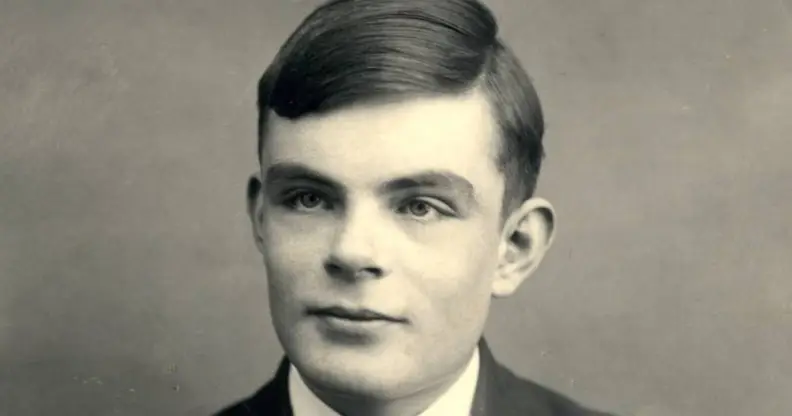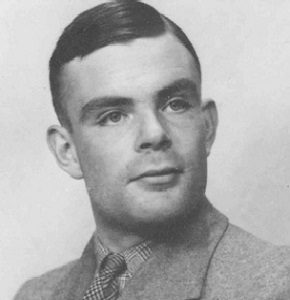Controversial sculpture honouring gay war hero Alan Turing gets green light at Cambridge university

Alan Turing took his own life after being convicted of gay sex offences. (Getty)
A sculpture commemorating Alan Turing, the wartime codebreaker who died after being convicted of gay sex offences, has been approved at the University of Cambridge.
The sculpture by Sir Antony Gormley, most famous for the Angel of the North, will be made up of 19 steel blocks arranged to resemble a figure, and stand at more than 12ft tall, according to the BBC.
The sculpture will be a permanent fixture, and is set to be placed next to the Wilkins Building in King’s College, where Turing himself studied from 1931 to 1934.
Visitors will have to pay to view the artwork at allocated times, however, as King’s College said opening the grounds for the sculpture would be “impossibly disruptive” for students.
A college spokesperson told Cambridge City Council: “Paying visitors will also be able at allocated times to view from close up.
“It is hard to overestimate the public benefit of this major work of commemorative art for the college, university and the city.
“It will, we all believe, be a source of great pleasure and interest to many people.”

Alan Turing (Getty)
Local councillor Dave Baigent had argued that the statue should be located on a public road outside the college.
“I walk down Kings Parade with my granddaughter, I want her to say to me ‘who is that, what is that’, in the same way she might say about the statue out the front of [the Guildhall],” he said, according to the Ely Standard.
“I will say that is the man that cracked the German’s code, that is the man who helped to shorten the Second World War.
“That is the man who was challenged by our society, neutered, punished, and sunk into obscurity because of the treatment of homosexuals at that time.
“I want to be able to see this statue, not have it hidden away.”
Historic England had also raised concerns, saying the sculpture would be “far more visible” than originally thought, and that it could cause “some harm” to the historic college’s character.
Art critic Waldemar Januszczak previously said the sculpture’s abstract design would be jarring.
“If there’s one thing contemporary art has proved over and over again it’s that the mix of gothic and contemporary doesn’t work,” he said in 2020, according to the Art Newspaper.
Alan Turing is known as a war hero and a giant of computer science, whose work in codebreaking played a pivotal role in ending the Second World War.
During the war, Turing worked at the famous Bletchley Park where he cracked the Enigma code use by the German navy to transmit secret communications; it has been said that without the work of him and his colleagues, the war might have continued for two to four further years.
After the war ended, Turing continued to work on computing innovation, working on the “Turing test” in 1950 to determine whether a computer was artificially intelligent, a concept still relied on in AI today.
Turing’s life, however, was destroyed by homophobia after he was arrested in January 1952 and forced to admit that he’d had a sexual relationship with 19-year-old Arnold Murray.
He admitted to “acts of gross indecency”, and underwent a horrific chemical castration process in order to avoid jail. His conviction meant that his security clearance at GCHQ was revoked, and he was banned from entering the US.
On June 7, 1954, aged 41, Alan Turing died by suicide.
It wasn’t until 2009 that the government apologised for the treatment Turing received, with then-prime minister Gordon Brown describing his ordeal as “horrifying” and “utterly unfair”.
“This recognition of Alan’s status as one of Britain’s most famous victims of homophobia is another step towards equality and long overdue,” he wrote in a statement.
“Alan deserves recognition for his contribution to humankind… It is thanks to men and women who were totally committed to fighting fascism, people like Alan Turing, that the horrors of the Holocaust and of total war are part of Europe’s history and not Europe’s present.
“We’re sorry, you deserved so much better,” he wrote in a statement.
In July 2019, when Turing was honoured on the new £50 note, Mark Carney, then governor of the Bank of England, said: “Alan Turing was an outstanding mathematician whose work has had an enormous impact on how we live today.
“Turing is a giant on whose shoulders so many now stand.”

